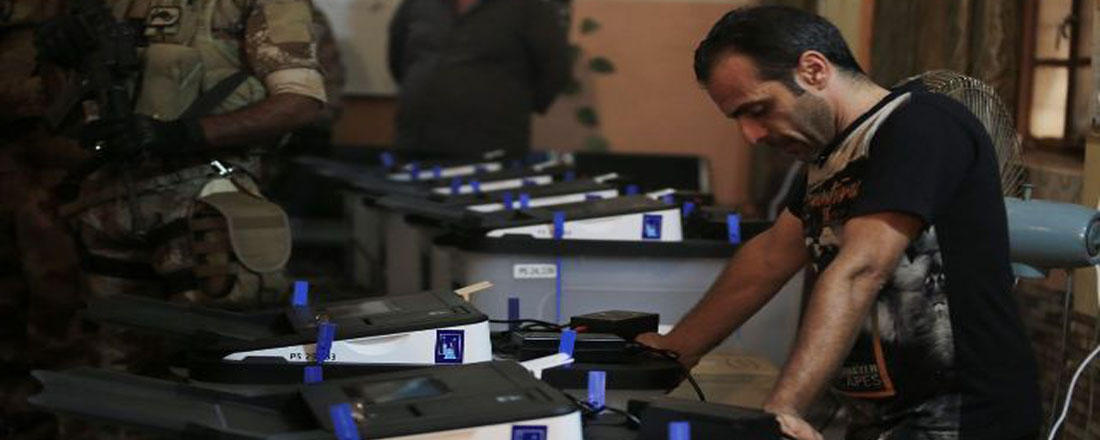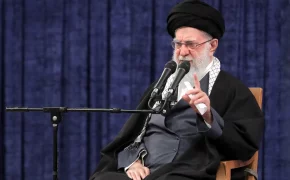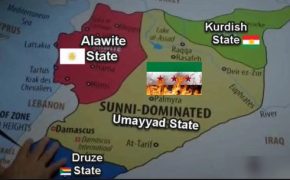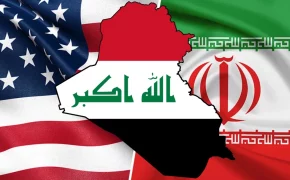The First Elections of Iraq After the Defeat of ISIS and the First Electronic Election; Introducing Iraqi Coalitions.

Islamic World News Analysis Group: After many conflicts about the result of the Iraqi parliamentary election, the election committee of Iraq, postpone the official announcement on final results to Thursday or Friday.
According to the unofficial results, “The Alliance of Revolutionaries for Reform” (Sairoon) with the leadership of Muqtada Sadr gained 55 seats, “The Victory Alliance” (Al-Nasr) with the leadership of Haider al-Abadi gained 51 seats, “The Fatah Alliance” with the leadership of Hadi Al-Amiri gained 50 seats.
Meanwhile in some cities, specially Kirkuk and the three provinces of Iraqi Kurdistan, the protests about the results and election manipulation continue.
After the announcment of 91% of election results and achieving first place in election by “The Alliance of Revolutionaries for Reform” (Sairoon), Muqtada Sadr in his twitter showed his cabinet choices and the way he wants to form his administration.
In his tweet, Sadr announced:
We “The Alliance of Revolutionaries for Reform” will act with “Wisdom” (Hikma), “Nationalism” (alwatanyah) and “The Will of The Electorate” (tajmae ‘iiradat alaintikhabii), and to create a “New Generation” we try and expect to see the “Change Movement” towards “Reforms”, and it is our “Decision” to create an iraq so that we raise the “Flags” of “Victory”, and Baghdad (our “identity”) is our capital, and our movement will be “Democratic” and we will form a “Technocratic Government” without “Partisanism”.
After this tweet, Nechirvan Barzani and Masoud Barzani —which because of the high tensions of this election, their absence in this election were overlooked — were the first ones to call and congratulate the alliance of revolutionaries for reform’s victory to Muqtada Sadr.
Because of very close difference in number of gained seats by the victorious political parties and coalitions, and the necessity to create a big coalition of different parties in order to ensure the formation of a bigger parliamentary group, the idea of forming such a coalition is hard and complicated.
The possible scenarios by some of the sources, about which of these coalitions will form the cabinet :
1. The state of law coalition, along with Fatah alliance and victory alliance.
2. The alliance of revolutionaries for reform, along with victory alliance, Fatah alliance and the national wisdom movement.
3. The alliance of revolutionaries for reform, along with Fatah alliance and the national wisdom movement.
4. The alliance of revolutionaries for reform, along with victory alliance and the national wisdom movement.
5. The alliance of revolutionaries for reform, along with victory alliance, patriotic union of Kurdistan (PUK), the Kurdistan democratic party (KDP or PD), and Al-Qarar.
6. The victory alliance , along with national wisdom movement, fatah alliance, state and law coalition, and the national coalition (Al-Wataniya)
7. The victory alliance, along with national wisdom movement, the national coalition (Al-Wataniya) and the alliance of revolutionaries for reform.
8. The victory alliance, along with state of law coalition, Fatah alliance, and the national wisdom movement.
✅ The Shia Coalitions
1) The Alliance of Revolutionaries for Reform
Muqtada Sadr, along with Iraq Communist Party, Justice Government Party, People’s Party for Reform, Committee of Union and Progress, And Republic of Iraq Party, forms this coalition.
2) The Fatah Alliance
Fatah or Fath Al-Mobin (Undeniable Victory) is a electoral coalition including different shia political factions backed by Hashd Al-Sha’abi (Popular Mobilization Forces, PMU) which announced it existance with registering itself in “Independent High Electoral Commission, ” of Iraq.
The main core of this treaty are as follows:
a. The Badr Organization (Munaẓẓama Badr) with the leadership of Hadi Al-Ameri
b. Brigades of the Party of God (Kata’ib Hezbollah)
c. League of Righteous People (Asa’ib Ahl al-Haq),
d. Soldiers of Imam Brigades (Kata’ib Jund al-Imam)
e. Islamic Supreme Council of Iraq (Al-Majlis Al-A’ala Al-Islami Al-‘Iraqi, namely, ISCI or SIIC)
and some other groups that are backed by “Popular Mobilization Forces”.
3) The Victory Alliance The head of this coalition is the prime minister of iraq, Haider Al-Abadi, also some of the prominent leaders of “Islamic Dawa Party” and and some sunni figures including, Khaled al-Obaidi former minister of defense of iraq.
4) State of Law Coalition
The head of this coalition is the former prime minister of iraq and the general secretary of “Islamic Dawa Party”, Nouri al-Maliki, which
5) The National Wisdom Movement
Sayyid Ammar al-Hakim, after leaving the “Islamic Supreme Council of Iraq”, established this movement.
✅ The Sunni Coalitions
1) The National Coalition (Al-Wataniya)
This coalition includes sunni groups of iraq which are under the leadership of Ayad Allawi and the participation of Salim al-Jabouri, head the “Civil Society for Reform”, and Saleh al-Mutlaq, head of the “Al-Arabiya Coalition” and some other political movements and figures.
2) Al-Qarar Al-Iraqi coalition
This coalition is under the leadership of Osama al-Nujaifi, former deputy of president and former head of iraq parliament. he formed a coalition with Khames Al-Khanjar, leader of the arabic project movement, Salman Al-Jumaili and other iraqi sunni figures.
✅ The Kurdish Coalitions
Kurdistan Democratic Party (KDP or PDK) and Patriotic Union of Kurdistan (PUK), The alliance of Taqiir Party, Jama`t Islami, Barham Salih





Comment